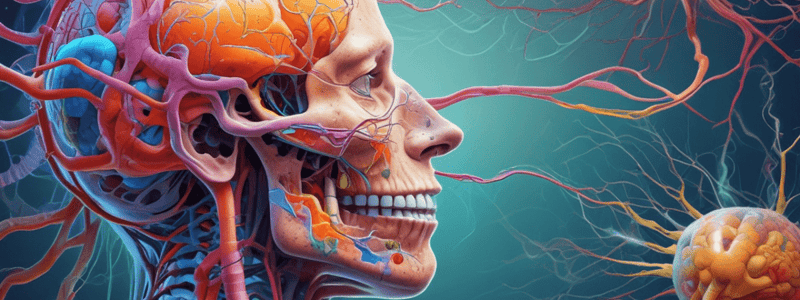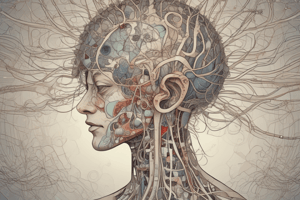Podcast
Questions and Answers
What are the four main categories of neurological disorders mentioned in the text?
What are the four main categories of neurological disorders mentioned in the text?
- Acute illnesses, degenerative diseases, developmental disorders, autoimmune conditions
- Infectious diseases, chronic pain syndromes, metabolic disorders, psychological disorders
- Sudden onset, chronic conditions, genetic disorders, autoimmune diseases
- Sudden onset conditions, intermittent and unpredictable conditions, progressive conditions, stable with changing needs (correct)
What are the typical causes of neurological disorders as mentioned in the text?
What are the typical causes of neurological disorders as mentioned in the text?
- Toxic substance exposure, excessive screen time, lack of vitamin D, excessive physical activity
- Hormonal imbalances, nutritional deficiencies, lack of exercise, psychological trauma
- Genes, environment, bacterial or viral infections, traumatic injuries or accidents (correct)
- Unhealthy diet, lack of sleep, social isolation, environmental pollution
What is the approximate global disease prevalence of neurological and psychiatric disorders according to the text?
What is the approximate global disease prevalence of neurological and psychiatric disorders according to the text?
- ~20%
- ~5%
- ~13% (correct)
- ~8%
Which part of the nervous system can neurological disorders affect?
Which part of the nervous system can neurological disorders affect?
What are some examples of sudden onset conditions among neurological disorders?
What are some examples of sudden onset conditions among neurological disorders?
Neurological and psychiatric disorders can be associated with abnormalities in ____.
Neurological and psychiatric disorders can be associated with abnormalities in ____.
Which of the following statements about glial cells is correct?
Which of the following statements about glial cells is correct?
What is the estimated annual prevalence of mental health disorders in the UK, according to Fineberg et al. (2013)?
What is the estimated annual prevalence of mental health disorders in the UK, according to Fineberg et al. (2013)?
Which of the following statements about the economic burden of brain disorders is correct?
Which of the following statements about the economic burden of brain disorders is correct?
Which of the following is NOT a function of the nervous system?
Which of the following is NOT a function of the nervous system?
Which of the following statements about neurons is correct?
Which of the following statements about neurons is correct?
What is the total number of neurons in the brain and spinal cord, according to the information provided?
What is the total number of neurons in the brain and spinal cord, according to the information provided?
What is the estimated total cost of mental health in Europe in 2010?
What is the estimated total cost of mental health in Europe in 2010?
Which of the following is NOT a direct non-medical cost related to mental health in Europe?
Which of the following is NOT a direct non-medical cost related to mental health in Europe?
What proportion of people in England are reported to experience a common mental health problem in any given week?
What proportion of people in England are reported to experience a common mental health problem in any given week?
Which of the following is NOT listed as a mental health condition in the text?
Which of the following is NOT listed as a mental health condition in the text?
What percentage of people in the UK are affected by neurological conditions according to the text?
What percentage of people in the UK are affected by neurological conditions according to the text?
What does a common mental health problem typically include?
What does a common mental health problem typically include?
What is the primary function of microglia in the nervous system?
What is the primary function of microglia in the nervous system?
How does the myelin sheath contribute to the efficient transmission of nerve impulses?
How does the myelin sheath contribute to the efficient transmission of nerve impulses?
What is the primary function of the blood-brain barrier (BBB)?
What is the primary function of the blood-brain barrier (BBB)?
Which of the following substances can readily cross the blood-brain barrier by diffusion?
Which of the following substances can readily cross the blood-brain barrier by diffusion?
What is the primary function of cerebrospinal fluid (CSF)?
What is the primary function of cerebrospinal fluid (CSF)?
Which part of the brain is associated with higher cognitive functions and processes?
Which part of the brain is associated with higher cognitive functions and processes?
Which neurotransmitter is primarily responsible for regulating anxiety, vision, and motor control?
Which neurotransmitter is primarily responsible for regulating anxiety, vision, and motor control?
What is the role of serotonin as a neurotransmitter?
What is the role of serotonin as a neurotransmitter?
Which neurotransmitter is the most abundant in the Central Nervous System (CNS)?
Which neurotransmitter is the most abundant in the Central Nervous System (CNS)?
What happens when there are low levels of GABA in the body?
What happens when there are low levels of GABA in the body?
Which of the following is a precursor to melatonin and involved in sleep regulation?
Which of the following is a precursor to melatonin and involved in sleep regulation?
What functions are primarily associated with glutamate as a neurotransmitter?
What functions are primarily associated with glutamate as a neurotransmitter?
The central nervous system (CNS) is composed of both the brain and the spinal cord.
The central nervous system (CNS) is composed of both the brain and the spinal cord.
Neurological disorders can only be caused by genetic factors and not environmental factors.
Neurological disorders can only be caused by genetic factors and not environmental factors.
Parkinson's disease and dementia are examples of progressive neurological conditions mentioned in the text.
Parkinson's disease and dementia are examples of progressive neurological conditions mentioned in the text.
The global disease prevalence of neurological and psychiatric disorders is approximately 25%.
The global disease prevalence of neurological and psychiatric disorders is approximately 25%.
Narcolepsy is classified as an intermittent and unpredictable neurological condition in the text.
Narcolepsy is classified as an intermittent and unpredictable neurological condition in the text.
Structural, biochemical, or electrical abnormalities in the brain, spinal cord, or nerves can cause neurological disorders.
Structural, biochemical, or electrical abnormalities in the brain, spinal cord, or nerves can cause neurological disorders.
Astrocytes with short branching processes are primarily found in white matter.
Astrocytes with short branching processes are primarily found in white matter.
Most neurons are capable of undergoing mitotic divisions.
Most neurons are capable of undergoing mitotic divisions.
The spinal cord contains more neurons than the brain.
The spinal cord contains more neurons than the brain.
Microglia play a minimal role in maintaining the chemical environment for nerve impulse generation.
Microglia play a minimal role in maintaining the chemical environment for nerve impulse generation.
Glial cells primarily function to transmit nerve impulses.
Glial cells primarily function to transmit nerve impulses.
Neurons consist of dendrites, a cell body, and an action potential.
Neurons consist of dendrites, a cell body, and an action potential.
Oligodendrocytes form and maintain the myelin sheath around PNS axons.
Oligodendrocytes form and maintain the myelin sheath around PNS axons.
The hypothalamus is solely responsible for regulating emotional and behavioral patterns in the brain.
The hypothalamus is solely responsible for regulating emotional and behavioral patterns in the brain.
The brain consumes approximately 10% of the oxygen used by the body.
The brain consumes approximately 10% of the oxygen used by the body.
The substantia nigra is involved in the production of dopamine, which acts as an excitatory neurotransmitter.
The substantia nigra is involved in the production of dopamine, which acts as an excitatory neurotransmitter.
The thalamus relays sensory information from the cerebral cortex to the cerebellum and basal nuclei.
The thalamus relays sensory information from the cerebral cortex to the cerebellum and basal nuclei.
Blood-brain barrier allows easy diffusion of most antibiotics into the brain.
Blood-brain barrier allows easy diffusion of most antibiotics into the brain.
The suprachiasmatic nuclei (SCN) in the hypothalamus are responsible for regulating feeding and satiety centers.
The suprachiasmatic nuclei (SCN) in the hypothalamus are responsible for regulating feeding and satiety centers.
Cerebrospinal fluid primarily provides mechanical protection to the brain and spinal cord.
Cerebrospinal fluid primarily provides mechanical protection to the brain and spinal cord.
Norepinephrine, also known as noradrenalin, is an excitatory neurotransmitter produced in the adrenal glands and involved in the stress response.
Norepinephrine, also known as noradrenalin, is an excitatory neurotransmitter produced in the adrenal glands and involved in the stress response.
Cerebral cortex is a thick, multilayered structure consisting mainly of white matter.
Cerebral cortex is a thick, multilayered structure consisting mainly of white matter.
The frontal lobes of the brain are primarily associated with basic motor functions.
The frontal lobes of the brain are primarily associated with basic motor functions.
The limbic system is unique to mammals and is primarily involved in species preservation and self-preservation behaviors.
The limbic system is unique to mammals and is primarily involved in species preservation and self-preservation behaviors.
GABA is the primary excitatory neurotransmitter in the Central Nervous System (CNS).
GABA is the primary excitatory neurotransmitter in the Central Nervous System (CNS).
Glutamate plays a key role in regulating cognitive functions, memory, and learning.
Glutamate plays a key role in regulating cognitive functions, memory, and learning.
Serotonin acts as an excitatory neurotransmitter in the brain regions specialized for mood, emotion, and appetite.
Serotonin acts as an excitatory neurotransmitter in the brain regions specialized for mood, emotion, and appetite.
Melatonin is primarily responsible for balancing out excessive excitatory effects of neurotransmitters in the brain.
Melatonin is primarily responsible for balancing out excessive excitatory effects of neurotransmitters in the brain.
Oligodendrocytes are supporting glial cells found in the Central Nervous System (CNS).
Oligodendrocytes are supporting glial cells found in the Central Nervous System (CNS).
Disruption of specific brain regions specialized for certain functions will not result in associated symptoms.
Disruption of specific brain regions specialized for certain functions will not result in associated symptoms.
Flashcards are hidden until you start studying
Study Notes
- Serotonin is an inhibitory neurotransmitter that plays a role in mood, emotion, appetite, digestion, and is a precursor to melatonin for sleep. It helps balance out excessive excitatory effects.
- GABA is the primary inhibitory neurotransmitter regulating anxiety, vision, and motor control. Low levels can lead to irritability and anxiety.
- Glutamate is the most abundant excitatory neurotransmitter in the central nervous system, affecting cognitive functions, memory, and learning.
- The brain is specialized in different regions for specific functions, and disruptions in these regions lead to related symptoms.
- The central nervous system is comprised of neurons and supporting glial cells like astrocytes, microglia, and oligodendrocytes.
- Neurological disorders can be caused by genetic factors, environmental factors, infections, or traumatic injuries, with over 600 known conditions falling into four main categories.
- Mental health conditions like depression, anxiety, personality disorders, bipolar disorder, and schizophrenia can cause distress or impairment in personal functioning.
Studying That Suits You
Use AI to generate personalized quizzes and flashcards to suit your learning preferences.




